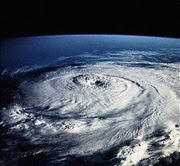 Angry Earth
Angry EarthA group of top climatologists meeting in Paris, France have released a compelling report that officially puts the blame on humans for global warming. The scientists are 90% certain that we are to blame for increasing global temperatures and rising ocean levels. The most haunting aspect of the report states that global warming is a runaway process; there is nothing we can do to halt it. It is essentially like a large train with no brakes speeding down the tracks at 100mph and no one can stop it. What is worse, the climatologists believe that Earth’s median temperature will increase 3.5-7 degrees by 2100. When global temperature increases, ocean levels rise, which by 2100 may rise by 23 inches. This truly alarming report is an eye opener to what mankind is capable of doing; ruining our home.
Of course with any new report on global warming, many conservatives are going to allege that the idea of humans screwing the Earth up is not conceivable. I am not one to take such reports at face value, but I am alarmed by this latest premonition. Some would argue that this is just a natural Earth cycle and that this is just a warming cycle. But the evidence tells the tale for us in this particular case. How can anyone counter the fact that CO2 levels have rose exponentially since 1700; the eve of the Industrial Revolution? With more CO2 in the atmosphere, that means the sun’s rays are forever trapped in our atmosphere, hence warming the planet. One cannot forget the stunning pictures of ancient icebergs breaking off of glaciers due to the increased temperatures at both the extreme northern and southern latitudes.
The damage is already done; there isn’t anything we can do in the short term to repair what we have taken for granted. Obviously there are actions that can be taken to help lessen the severity of the onset of extreme global warming conditions. The U.S. and other industrialized countries are heading in the right direction in concern to lessening CO2 emissions. Following the Kyoto accords is vital in maintaining what we have now. Either way, the effects of global warming are more far reaching than we think. Coastal areas are especially vulnerable, as we have witnessed the last few years with the occurrence of countless intense hurricanes and typhoons. Cities like New Orleans that are already below sea level may have legendary status like the fabled lost island of Atlantis when our children grow older.
No comments:
Post a Comment